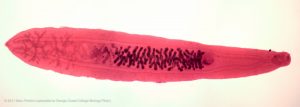Data collected through genomics research is revolutionizing the way we treat cancer. But a large population of cancer patients are being denied the benefits of this research.

Patrick Tan MD, PhD is a professor of cancer and stem cell biology at Duke-NUS Medical School in Singapore.
In 2016, less than one percent of all the existing genomic data came from the 60% of the world population living outside of the US, Europe, and Japan. Furthermore, 70% of patients who die from cancer this year will come from Asia, Africa and Central and South America.
Patrick Tan, M.D., Ph.D., and the Duke-National University of Singapore (Duke-NUS) Medical School are key players in an effort to rectify this discrepancy, specifically as it exists in Southeast Asia.
In his talk, sponsored by the Duke Center for Applied Genomics and Precision Medicine, Tan focused specifically on his work in northeast Thailand with cholangiocarcinoma (CCA), or bile duct cancer.

Liver flukes like this are parasites of fish that migrate to human hosts who eat the fish raw, leading to a form of bile duct cancer.
While CCA is rare in most of the world, it appears at 100 times the global rate in the region of Thailand where Tan and his colleagues work. Additionally, CCA in this region is of a separate and distinct nature.
CCA in this region is linked with a parasitic infection of the bile ducts called a liver fluke. Residents of this area in Thailand have a diet consisting largely of raw fish, which can be infected by the liver fluke and transmitted to the person who eats the fish.
Because of the poverty in this area, encouraging people to avoid eating raw fish has proven ineffective. Furthermore, healthcare is not readily available, so by the time most patients are diagnosed, the disease has progressed into its later and deadly stage.

The life cycle of liver flukes. (Graphic U.S. Centers for Disease Control)
Tan’s genomic research has discovered certain factors at the gene level that make liver-fluke positive CCA different from other CCA. Thus genomic data specific to this population is vital to improve the outcomes of patients with CCA.
Duke-NUS Precision Medicine (PRISM) has partnered up with the National Heart Research Institute Singapore (NHRIS) in SPECTRA, a program designed to create a database of genomic data from the healthy Asian population. SPECTRA is sequencing the genomes of 5,000 healthy Asians in order to create a baseline to which they can compare the genomes of unhealthy individuals.
These and other programs are part of a larger effort to make precision medicine, or healthcare tailored to an individual based on factors like family history and genomic markers, accessible throughout southeast Asia.
By Sarah Haurin

